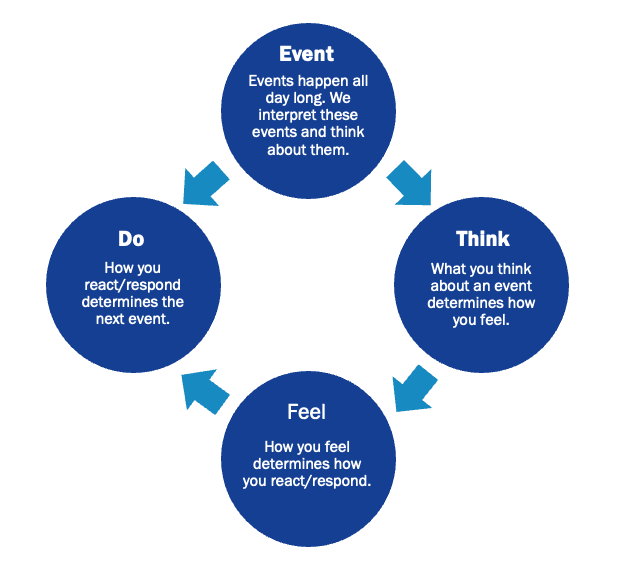React vs. respond
It is difficult to be objective and effective when emotions are running high. Taking the time to correctly label and reflect on an emotion can help decrease its intensity. When the emotional level of the conflict has been reduced, reasoning abilities can function more effectively. This allows you to respond versus react.
When you react, you are working from a place of emotion and when you respond you are working from a place of reflection.
Reacting typically involves emotionally charged aggressive approaches with little thought on a positive impact/outcome. This usually leads to a back-and-forth exchange of threatening and negative emotional interactions.
Responding typically involves taking a step back to reflect on your emotions and the conflict so you can respond in a more rational and non-threatening way. This usually leads to discussion which allows for mutual understanding and exploration of possible solutions.
To increase your chances of responding to incidents in a rational and thoughtful way and limit emotionally charge reactions it may be helpful to keep the following cycle in mind.
Think-Feel-Do cycle
When looking at the Think-Feel-Do cycle, THINK is where we need to pay attention. We commonly think things happen to us and do not see our influence over an event.
We need to be conscious of our voices and ask such questions as, ”Is it reasonable to believe?” “Do I have bias?” It’s not about turning the negative into the positive. It's ensuring you’re having reasonable and rational thoughts. If we are having more reasonable thoughts, then we will have better outcomes.

Resources
‘Un-hooking’ from emotionally charged circumstances [PDF - 265KB]
It is common for individuals to spend most of the day attempting to manage the difficult people in their environment and find it difficult to ‘unhook’ from these emotions. Learn how to ‘un-hook’ from these emotionally upsetting circumstances using this resource sheet.
Managing emotions - reflection worksheet [PDF - 192KB]
It is difficult to be objective and effective when emotional levels are high. Taking the time to correctly label and reflect on an emotion can help decrease its intensity. When the emotional level of the conflict has been reduced, reasoning abilities can function more effectively.
Managing anger and the anger arousing cycle
Managing how we express our anger is a fundamental skill needed to live peacefully with others. If others cannot trust that you will speak to them calmly and rationally, they often respond with withdrawal and avoidance. Letting our emotions spill over in angry words and speech is not productive, nor is it healthy.